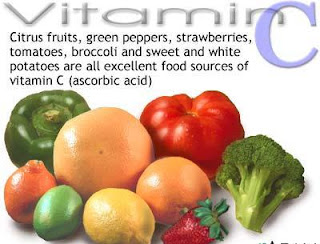Benefits of Vitamin C (Ascorbic Acid)
Vitamin C (also known as ascorbic acid) is abundant in vegetables and fruits. A water-soluble vitamin and powerful antioxidant, it helps the body form and maintain connective tissue, including bones, blood vessels, and skin.
Vitamin C, or Ascorbic acid, is one of the most effective and safest nutrients. It is a water soluble vitamin. The human body doesn’t have the capacity to generate Vitamin C. Therefore, it needs to be received through food and other supplements.
Natural Dietary Sources of Vitamin C:
Many types of food are fortified with vitamins and vitamin C is usually in the mix. However, like all vitamins, it’s best to get your daily intake from organic, natural sources and the best, natural sources of vitamin C are fruits and vegetables.
Red or Yellow Bell Pepper,Orange Juice, Grapefruit Juice,Kiwifruit,Green Bell Pepper,
Broccoli,Strawberries,Brussels sprouts,
Grapefruit,Broccoli,Tomato juice,Cantaloupe,
Cabbage,Cauliflower.
Prevention of Scurvy:
Scurvy is prevented by an insufficient intake of vitamin C. The symptoms of scurvy appear due to the weakening of connective tissues, bones, and blood vessels that include collagen. Vitamin C, a powerful antioxidant, is required for the production of collagen.
Health Benefits of Vitamin C:
Health Benefits of Vitamin C:
Vitamin C helps to repair and regenerate tissues, protect against heart disease, aid in the absorption of iron, prevent scurvy, and decrease total and LDL ("bad") cholesterol and triglycerides. Research indicates that vitamin C may help protect against a variety of cancers by combating free radicals, and helping neutralize the effects of nitrites (preservatives found in some packaged foods that may raise the risk of certain forms of cancer). Supplemental vitamin C may also lessen the duration and symptoms of a common cold; help delay or prevent cataracts; and support healthy immune function.
Curing Cataracts (Eye Disorder):
Cataracts are the most common conditions of visual problems. A decrease in the level of vitamin C in the lens of the human eye has been found more commonly when cataracts are present. An increase of vitamin C intake increases the blood supply to the ocular areas of the body.
Treatment of Cancer:
Treatment of Cancer:
Researchers have found that a high consumption of fresh vegetables and fruits have a link to a minimized risk for various types of cancer. Studies have also shown that increased consumption of vitamin C is connected with a decreased possibility of cancers of the lungs, mouth, vocal chords, throat, colon, rectum, stomach, and esophagus.
Combating Stroke:
Combating Stroke:
Vitamin C also helps in reducing the risk of stroke, a type of cardiovascular disease. A diet full of vegetables and fruits supplies a good quantity of vitamin C, which maintains the appropriate blood pressure level. It also protects the body from free radicals which could be the reason for the stroke.
Mood:
Vitamin C plays a key role in the production of neurotransmitters, like norepinephrine. They affect the mood of a person, and they are critical to the proper functioning of the brain.
Immunity:
Immunity:
Immunity is another important benefit of this vitamin. Vitamin C is widely known for its contribution to the immune system of the body and its stimulation of white blood vessels.
Treatment of the Common Cold:
Treatment of the Common Cold:
Vitamin C enhances the immune system of our body, which protects us from colds and coughs. It facilitates the absorption of iron and therefore strengthens the body’s resistance to infection. It also fights against viruses.
Lowering Hypertension:
Lowering Hypertension:
People with hypertension are at a high risk of developing cardiovascular diseases. The supplement of vitamin C intake helps in lowering the body’s blood pressure.





Comments
Post a Comment